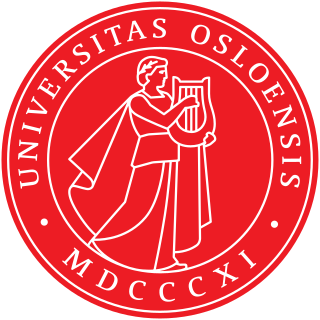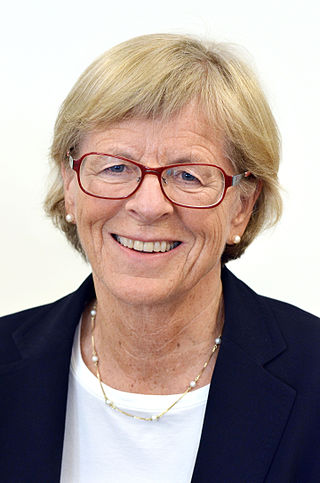Related Research Articles

The University of Oslo is a public research university located in Oslo, Norway. It is the oldest university in Norway. Originally named the Royal Frederick University, the university was established in 1811 as the de facto Norwegian continuation of Denmark-Norway's common university, the University of Copenhagen, with which it shares many traditions. It was named for King Frederick VI of Denmark and Norway, and received its current name in 1939. The university was commonly nicknamed "The Royal Frederick's" before the name change, and informally also referred to simply as Universitetet.

Åslaug Marie Haga is Norwegian diplomat, politician and international civil servant. She has been board chair for various organizations, including the Norwegian Institute for Nature Research (NINA) and the Peace Research Institute in Oslo (PRIO). Haga has published three books: two on Norwegian politics and one novel.
Oslo University College was the largest state university college in Norway from 1994 to 2011, with more than 18,000 students and approximately 1800 employees. Oslo University College merged with Akershus University College to form Oslo and Akershus University College in 2011, and this institution became Oslo Metropolitan University in 2018.

The Peace Research Institute Oslo is a private research institution in peace and conflict studies, based in Oslo, Norway, with around 100 employees. It was founded in 1959 by a group of Norwegian researchers led by Johan Galtung, who was also the institute's first director (1959–1969). It publishes the Journal of Peace Research, also founded by Johan Galtung.

Tove Astri Strand is a Norwegian director and former politician for the Labour Party. She was active in politics between 1963 and 1992, including two periods as a government minister. She headed the Norwegian Agency for Development Cooperation from 1997 to 2005, and since 2005 she is the director of Ullevål University Hospital.
The Government agencies of Norway are state controlled organizations that act independently to carry out the policies of the Government of Norway. The Government Ministries are relatively small and merely policy-making organizations, allowed to control agencies by policy decisions but not by direct orders. A Minister is explicitly prohibited from interfering with the day-to-day operation in an agency or the outcome in individual cases. While no minister is allowed to give orders to agencies personally, they are subject to decisions made by the Government. Also, the Minister is normally the instance of appeals of agencies decisions.
The Royal Ministry of Education and Research is a Norwegian government ministry responsible for education, research, kindergartens and integration. The ministry was established in 1814 as the Royal Ministry of Church and Education Affairs.
The Centre for Development and the Environment is a research institute which is part of the University of Oslo. Its focus areas are international development and environmental studies.
Ingrid Eide is a Norwegian sociologist, United Nations official and politician for Norway's Labour Party.
Målfrid Grude Flekkøy was a Norwegian chief psychologist and civil servant. Having worked for several years in different health and educational institutions for children she was appointed as Children's Commissioner in Norway from 1981 to 1989, the first person in the world to hold such a position. She established and developed the role, and after eight years the UN Organization for Children UNICEF engaged her to assist in spreading the institution to other countries. Flekkøy travelled extensively, participated in professional organizations and wrote books and articles on children's rights. At her death in 2013, more than 80 children's commissioners had been set up around the world.

Torild Skard is a Norwegian psychologist, politician for the Socialist Left Party, a former Deputy Permanent Secretary at the Ministry of Foreign Affairs and a former Chairman of UNICEF.
The Norwegian Centre for Violence and Traumatic Stress Studies is a research centre in Oslo, Norway, and Norway's national research institution in violence and sexual abuse; disaster management, terrorism, armed conflicts and traumatic stress; and forced migration and refugee health research. It is interdisciplinary and employs experts mainly in psychology, psychiatry, and the social sciences. In addition to carrying out research and related activities, the institute advises the Government of Norway in its areas of expertise and has some official emergency management functions at the national level. NKVTS has 101 employees.
Norwegian Social Research is a state social science research institute based in Oslo, Norway. It is part of Oslo Metropolitan University, and was formerly an independent state agency from its establishment in 1996 until 2014. Together with the Work Research Institute, the Norwegian Institute for Urban and Regional Research and the National Institute for Consumer Research, it now forms the Centre for Welfare and Labour Research at Oslo Metropolitan University.
Oslo and Akershus University College was the largest state university college in Norway from its establishment in 2011 until 2018, when it was transformed into Oslo Metropolitan University, the youngest of Norway's new universities.
Bjørn Gustavsen is a Norwegian academic and working life researcher. He has been Director of the Work Research Institute (1972–1983) and Professor at the Arbetslivscentrum in Stockholm (1986–1999), the University of Oslo (1995–1999) and the Norwegian University of Science and Technology. He is originally trained as a lawyer, and took the cand.jur. degree at the University of Oslo in 1964. He was an assistant judge 1965-66. After fours years as a research fellow at Norges almenvitenskapelige forskningsråd, he became a researcher at the Work Research Institute in 1970.
Olav Eikeland is a Norwegian philosopher and working life researcher. Since 2008, he is professor of work research and research director for the Program for Research on Education and Work at Oslo Metropolitan University. Since 2012, he is also vice dean of the Faculty of Education and International Studies. He was a researcher at the Work Research Institute from 1985 to 2008, and served as the institute's director 2003-2004.
forskning.no is an Oslo-based online newspaper established by the Research Council of Norway in 2002. It publishes news about science and research from Norway and abroad. The web site is run by Foreningen for drift av forskning.no, a non-profit organization which has 78 research institutions as members. forskning.no has its own writers and journalists and freelance writers. In addition articles are submitted by the research institutes and then edited by forskning.no staff before being published. Its English-language version is known as sciencenorway.no.
Oslo Business School is the graduate business school of Oslo Metropolitan University. Located in Oslo, Norway, the school offers study programs at both Bachelor and Master level, as well as a wide range of continuing and further education, in business administration, finance and management.

Curtis Calvin Rice is an American-born Norwegian linguist. He was the rector of the Norwegian University of Life Sciences from 2021 to 2023. Until 2021, he was the rector of Oslo Metropolitan University and formerly of its predecessor institution, Oslo and Akershus University College. Rice was the first rector of Oslo Metropolitan University who was not elected. He began his rectorship at Oslo Metropolitan University on 1 August 2015. A major issue of his tenure as rector has been the question of whether HiOA should apply for the status of a university to become one of Norway's new universities; it received this status on 12 January 2018. Rice is known for controversial views on the status of the Norwegian language in academia, having called for a ban on research papers in Norwegian.

Oslo Metropolitan University is a state university in Oslo and Kjeller in Norway. It is the result of the merger of many former vocational colleges in the Greater Oslo Region. It has around 1,400 academic employees, around 20,000 students and around 800 administrative support staff.
References
- ↑ "The Work Research Institute - AFI - Arbeidsforskningsinstituttet". Archived from the original on 2011-07-24. Retrieved 2009-12-19.
- ↑ "Arbeidsforskningsinstituttet AFI".